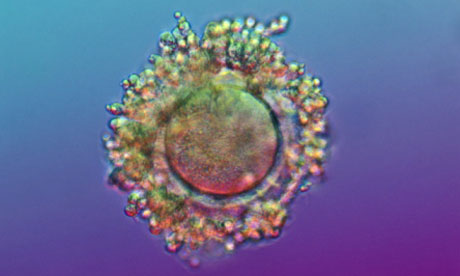
Single women who have their eggs frozen so they can put off having a family till later in life may be delaying the procedure too long, fertility specialists warn.
Freezing offers women the chance to store their eggs while they are still in good condition, but many wait until their late-30s, when the quality of their eggs has started to decline, scientists found.
Researchers said women who had their eggs frozen for non-medical reasons were typically aged 37-39. But flaws that accumulate in eggs over time lead to a rapid decrease in fertility over the age of 35.
A team led by Aylin Pelin Cil, at Reproductive Medicine Associates in New York, analysed 26 studies on egg freezing and found women were more likely to conceive if their eggs were frozen when they were under 30.
The analysis included 1,990 cycles of fertility treatment using eggs that were frozen slowly and 291 cycles of treatment with eggs that had been rapidly frozen through a technique called vitrification.
The likelihood of an embryo created from a slow-frozen egg implanting in the womb fell from 10.4% in women who were under 30 when it was frozen to 4.7% in women who had been over 40. The implantation rates for embryos made from vitrified eggs was higher, but suffered a similar decline with age, from 18.8% in the under-30s to 10.3% in the over-40s.
The results will be discussed at the American Society for Reproductive Medicine (ASRM) meeting in Orlando on Tuesday.
Roger Lobo, president of the ASRM and head of obstetrics and gynaecology at Columbia University in New York, said the study highlighted the importance of not delaying motherhood.
"Despite increasing numbers of clinics offering the procedure and the significant media attention paid to it in recent years, women are not pursuing elective egg freezing at an age when it would be most likely to help them accomplish their fertility goals," he said. "It is apparent that patients need more education about their fertility at younger ages."
But Gillian Lockwood, medical director at Midland Fertility Services in Aldridge, near Birmingham, said: "Egg freezing is not an option for many women in their late 30s when they've discovered Mr Right has turned out to be Mr Wrong, because it possibly is too late.
"But we have to ask what the comparator is here. The comparator is how well will these women do with their own eggs in their early 40s? A 39-year-old frozen egg is going to do better in IVF than a 42-year-old fresh egg, because the drop-off becomes so sharp during these years."
Dr Lockwood said she sees many women in their mid to late-30s who hope to freeze their eggs. "Unfortunately, 37 is the cusp when the chances go from more or less OK to really not good," she said.
"The women I see who are freezing for social reasons, their stories are very similar. They have been in the same relationship since their late 20s, early 30s, with a man they thought was going to be the father of their child.
"The woman gets to 36 or 37 and says 'I think it's about time we had a child' and he says he's not ready to settle down yet."

